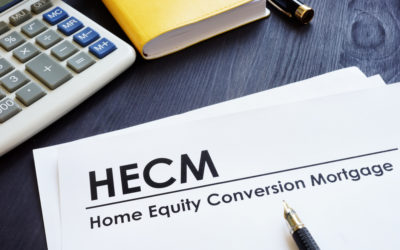When planning your retirement, it’s important to set aside enough funds to last you through your golden years. If you’re worried the money you’ve already saved won’t be enough, a reverse mortgage–also known as a HECM loan–may be a possible solution.
If you qualify for a reverse mortgage under the reverse mortgage guidelines, you can access funds by converting the equity you have in your home into usable cash as loan proceeds. However, by agreeing to the terms and conditions set up by your lender and federal housing regulations, you will be responsible for a series of reverse mortgage costs.
Below, you can read about some of the expenses you may encounter with a reverse mortgage loan. Navigate to the section related to your query or keep reading for a full survey of fees.
Overview of Reverse Mortgages
Before we dive into the costs of this type of loan, let’s take a closer look at how a reverse mortgage works.
A reverse mortgage is a special type of loan designed for seniors, which allows homeowners to tap into their home’s equity to access usable funds.
In order to qualify for a reverse mortgage, you must meet certain conditions. These include, but are not limited to, the following:
- At least one borrower must be 62 or older
- You must own your home and have a substantial amount of equity in the property
- The property must be your primary residence
- You may not be delinquent on any federal debt
- You must have the financial resources required to consistently make payments for ongoing property expenses, such as property taxes, HOA fees, insurance, maintenance, etc.
Your home is used as collateral for a HECM loan. Unlike conventional loans which require minimum payments each month, you’ll only need to make a payment on your loan when it becomes Due and Payable. Loan maturity events include the following:
- The home is sold
- All borrowers move out of the home
- All borrowers pass away
The loan becomes Due and Payable if the borrower fails to comply with the reverse mortgage terms, including timely payments on required maintenance, homeowner’s insurance and property taxes

Reverse Mortgage Costs
As mentioned above, you don’t need to make monthly payments on a reverse mortgage. However, there are a series of fees and costs to keep in mind when applying for a HECM loan.
Here’s a breakdown of some of these costs*:
Reverse Mortgage Origination Fee
An origination fee is used to cover a lender’s operating costs when processing, underwriting, and closing your reverse mortgage loan.
Currently, a loan origination fee is either $2,500 or 2% of the first $200,000 of your property’s market value. Additionally, youpay 1% of the amount over $200,000. HECM origination fees currently have a ceiling of $6,000, so you won’t pay more than that. Note: some lenders may not charge the maximum allowed origination fee.
Mortgage Insurance Premium
The Mortgage Insurance Premium (MIP) is a fee designed to provide a measure of protection for both borrowers and lenders.
As indicated by the U.S. Department of Housing and Urban Development (HUD), MIP is FHA mortgage insurance, which guarantees you will receive expected loan advances.
The mortgage insurance premium covers guarantees provided by the FHA to both the consumer and lender. This type of protection ensures you’ll receive all agreed upon payments. If your home value doesn’t cover the loan balance, insurance will cover the difference.
When your reverse mortgage closes, you’ll pay a 2% MIP. Over the life of the loan, you’ll also need to pay an annual MIP, equaling 0.5% of the outstanding loan balance. You may also finance the mortgage insurance premium (MIP) as part of your loan.
Getting Started with Reverse Mortgages
If you’re looking to get started with a reverse mortgage, these articles can help guide you through all aspects of the process.
Guide to HECM Loan Reverse Mortgage Limits
Reverse Mortgage Appraisal Fee
Appraisal fees will also factor into your reverse mortgage cost. An appraiser is tasked with assessing the condition of the property and noting any necessary repairs. In some cases, you may need to make repairs before your property qualifies for a reverse mortgage.
If an appraiser estimates required repairs will cost more than 30% of the maximum claim amount, the HUD must review the property to determine if it’s acceptable for the reverse mortgage program. Once the issues are resolved, a second appraisal must be scheduled to ensure the repairs are completed.
If the estimated price of the home repairs is less than 15% of the maximum claim amount, the cost of the fixes may be completed after the reverse mortgage closes.
The fee for an official appraisal will depend on your location, and the size, age, and condition of your home.
Reverse Mortgage Interest
As is true of most loans, if you take out a reverse mortgage, you’ll need to pay interest to your lender in exchange for use of funds they’ve provided.
Your reverse mortgage interest rate may be fixed or variable:
- Fixed interest rates: If your reverse mortgage has a fixed interest rate, your interest rate won’t change over the life of the loan.
Typically, fixed interest rates are available to homeowners who request a lump sum payment, receiving all reverse mortgage proceeds when the loan closes (after you settle any existing mortgage or liens on the property).
- Variable rates: If your reverse mortgage has a variable rate, also called an adjustable rate, you may be able to choose from a range of disbursement options. However, there may be limits on how much you can withdraw at a given time. Variable rates may adjust on a monthly or yearly basis.

To calculate variable mortgage rates, your lender uses two variables: an index and a margin.
The index is a standard rate, which may go up or down based on market interest rates. Currently, lenders rely on a financial index called the London Interbank Offered Rate (LIBOR), which is an average value of the interest rate taken from estimates made by global financial institutions.
Lenders then consider their margin, an interest percentage that is added to the index. This is the money a lender makes from the loan.
Because reverse mortgages don’t require you to make monthly payments, your interest charges won’t affect the affordability of your loan in the same way they would a conventional mortgage.
Reverse Mortgage Servicing Fee
You may also be required to pay servicing fees for your reverse mortgage. These fees cover the maintenance tasks a lender must complete over the life of your loan. Servicing activities might include:
- The delivery of account statements
- Ensuring that you receive the proceeds of your loan
- Ensuring that you’ve kept up with HECM loan requirements
The amount you’ll pay in servicing fees depends on the type of interest rate attached to your loan. If your reverse mortgage interest rate adjusts annually, you may need to pay a monthly servicing fee of up to $30. If your loan’s interest rate adjusts on a monthly basis, your service fee will cost no more than $35 monthly.
When you close on your reverse mortgage, the servicing fee cost will be deducted from your available loan funds, then added to your loan balance each month, increasing your balance over time. Your lender may add the cost of the servicing fee into your interest rate.
Additional Reverse Mortgage Closing Costs From Third Parties
In addition to the above costs, you may encounter the following fees when closing on your reverse mortgage:
- Document Preparation Fee: The fee charged to procure and finalize all the papers involved in the loan process.
- Wiring Fee: The cost of wiring money between the lender and borrower.
- Title Insurance: Insurance that helps to protect the lender against any loss with regard to ownership of a property.
- Credit Report Fee: Your lender must assess your financial health by pulling a credit report, which may present an additional fee.
- Recording Fee: What the county you reside in charges to record a real estate transaction.
*Note: These are estimates based on current research. These fees may vary by region, lender, and other individual circumstances.
Find Out Your Reverse Mortgage True Cost with GoodLife
The above are just some of the reverse mortgage costs you might encounter. If you’re interested in getting a reverse mortgage and want to learn more about the total costs of a HECM loan, talk to one of our helpful reverse mortgage specialists today. We can help you determine if this is the financial tool that will help you to live The GoodLife in Retirement.

 1-866-840-0279
1-866-840-0279



